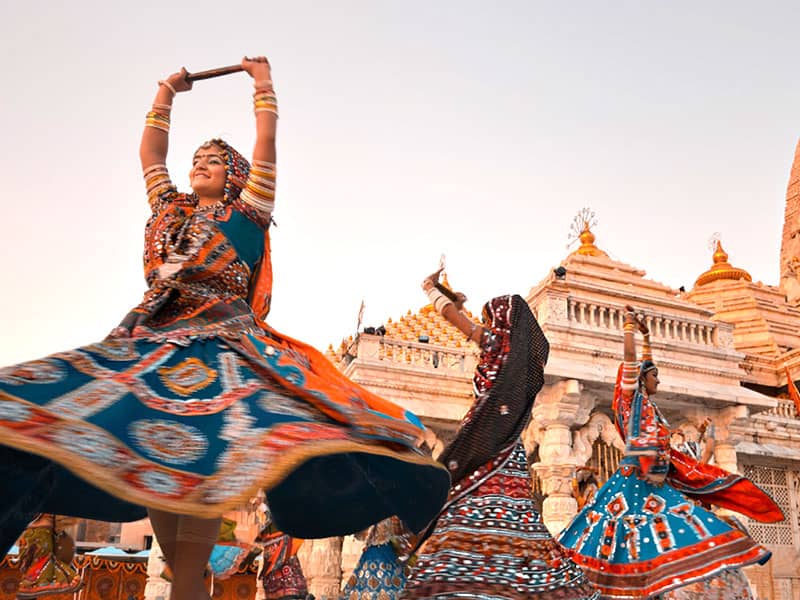Youth regularly join together to learn about Hinduism and perform its rituals Only a small red dot on Mira's forehead gave away her Hindu beliefs. Inside her one-bedroom apartment at Indiana University, however, the walls were splashed with vibrantly colored pictures of Hindu Gods and Goddesses. An incense stick spilled a thin line of jasmine-scented smoke into the music student's kitchen. Mira thinks it is somewhat difficult for her to be religious in college. "More people are into the social aspect of Indian culture," said Mira. Yet she has held onto the spiritual side of her heritage. Looking at the picture of Ganesha, Mira stated her simple ritual: "I think and I pray every day."
Among the approximately 100,000 Hindu university students in the United States, Mira is one of the many trying to keep true to their faith. On campuses in isolated and predominantly Christian towns, who or what is there to provide the courage, enthusiasm, or energy to keep their Hindu spirituality alive? Churches, mosques and synagogues are usually close to a college campus, but Hindu temples are harder to come by. Fortunately, there are ways for students to explore and enhance their knowledge of their Hindu heritage.
Kanchan Banerjee, one of the original founders and currently the national coordinator for the Hindu Students Council, says his group--an international student and youth forum promoting understanding of Hindu culture and heritage--has grown to 56 college chapters and five high school chapters across the United States and Canada. Thirteen other countries also maintain HSC chapters.
"We don't teach any specific sect, and always include various gurus and teachings from different areas of India," Banerjee said. A constitution sets the basic rules for the chapters, but chapters are more or less independent. Besides holding religious festival celebrations, they have study groups that meet weekly or twice a month.
"What we as a national body do is give ideas to our chapters lots of how-to stuff, books, etc." Banerjee added that HSC maintains a list of a few hundred speakers and is constantly networking with temples to provide local chapters with event sources.
Banerjee said that "our vision is to realize the greatness of dharma and be inspired and inspire people." But many Hindu university students, Banerjee admits, do not really understand what dharma is. Another Hindu student from Indiana University, senior biology major Sowmya Natarajan, confessed to this ignorance, "I'd heard the word and was vaguely familiar with what it meant." However, Natarajan said she was taking a class that explored the Bhagavad Gita and can also say a couple Sanskrit prayers. "They are prayers I learned when I was little--nothing complicated." Natarajan has come to incorporate prayer into her mornings before she starts each day, and she attributes this to her upbringing.
But in university, according to a study done by students at Brown University, Hindu students have a tendency to move away from the traditional aspects of Hinduism, such as rituals, and are placing much more emphasis on the values of Hinduism, regardless of the frequency with which their parents practiced. It is also common for children of most faiths to drift away from religion as a result of their college experience.
The board has six members and a membership list of approximately 70 students. Because there is already an Indian student group that focuses on the cultural aspect of India, Atma has emphasized their spiritual intent by joining the campus ministries association of the university and once a month holding a puja run by one Hindu student who organizes the chants for the event. "We talk about a little portion of the Vedas or the Gita and see how it pertains to our life," said Vakharia. The student group also leads a trip to a nearby temple every Sunday.
Even though Vakharia is at the head of Atma, she admits she knows just enough to get by. "I can recite some bhajanas and shlokas, I can do a Laksmi puja in Sanskrit. But I'm talking very, very basic stuff, nothing elaborate." But even this much knowledge of Hindu rituals is above average, according to the HSC's Banerjee.
"Twenty-five percent of Hindu students have very minimal knowledge of their culture. They have been to a temple and puja, but never really understood anything. Another one-fourth is very knowledgeable and they don't gain too much more during university, but they do have regularity in their activities." Banerjee referred to such things as finishing the Gita or whatever text the student has been studying. The remaining 50 percent know something about Hinduism, but really want to know more. "These are the main ones running the show," said Banerjee.
The HSC is currently doing extensive research on the classes dealing with Hinduism that universities often offer. Banerjee claims that in a majority of the cases, the programs are not good. "Books are either very old or biased and viewed from a Christian viewpoint." Banerjee hesitated but continued, saying, "They mess up actually. These courses teach very basic things, and the true meaning doesn't come out. For example, they say, 'You worship Lakshmi, and you will get lots of wealth.' But that's not why you should do it!"
Hindu college students, while supporting each other in their search for spirituality, are in the process of promoting the future of Hinduism in America and its universities. Mira said she intended to pass on the lifestyle and traditions of Hinduism to her children. "I would teach them about Hinduism make them aware, make them attend functions like I did." She hoped that they would eventually come to understand it on their own time, and accept Hinduism as their faith by their own choice as she has done. Online pujas you can perform: www.ashramonline.com/onpooja/onpooja_i.htm

